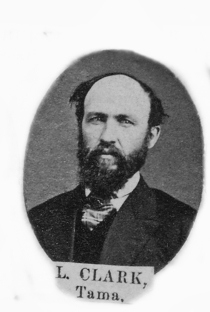Leander Clark

Leander Clark (July 17, 1823 - December 22, 1910) was an American businessman, Iowa state legislator, Union Army officer during the Civil War, and Indian agent who was the namesake for Leander Clark College.[1]
Clark was born July 17, 1823, in
In 1852, after his sojourn in California, he settled in Tama County, Iowa. In 1855 he became a justice of the peace in Tama County, in 1857 he began a four-year term as county judge, and in 1861 he began a term as the county's representative in the Iowa General Assembly.[1][3]
After the outbreak of the Civil War in 1862, he resigned his legislative seat to enlist in the
Upon returning to civilian life after the war, he served another term in the General Assembly, and in 1866 became
Clark became wealthy through the buying and selling of land, first in Iowa and later also in the Dakotas and Missouri. He also served for many years as president of the Toledo Savings Bank in Toledo, the county seat of Tama County where he made his home.[1]
Support for college
In 1902,
Accordingly, in 1906 Western College changed its name to
References
- ^ a b c d e f Henry W. Ward (1911), Western, Leander-Clark College, 1856-1911, Otterbein Press, Dayton, Ohio.
- ^ History of Tama County Chapter XIII Archived 2008-07-25 at the Wayback Machine, Union Publishing Company, Springfield, Illinois. 1883. Transcribed by Iowa GenWeb Project and accessed online July 15, 2010.
- ^ a b "Representative Leander Clark". Retrieved 2010-07-27.
- ^ Page 662, "History of Tama County Iowa, 1883".
- ^ Western College - A Brief History Archived 2010-06-05 at the Wayback Machine, Coe College Archives website, accessed June 21, 2010
- ^ Mike Donahey, Leander Clark College, The Times-Republican (Marshalltown, Iowa), August 2009
- ^ Lupton et al. v. Leander Clark College (Supreme Court of Iowa, April 4, 1922), 187 Northwestern Reporter 496.
